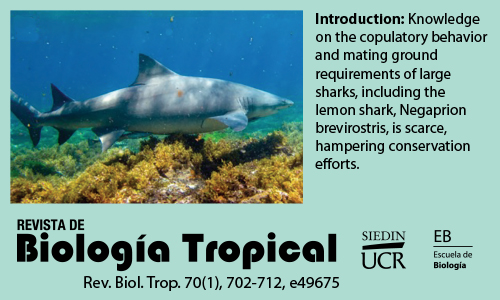Abstract
Introduction: Knowledge on the copulatory behavior and mating ground requirements of large sharks, including the lemon shark, Negaprion brevirostris, is scarce, hampering conservation efforts. Objective: To describe an area in the Equatorial Atlantic used as a mating ground by N. brevirostris, as well as part of the species pre-copulatory behaviors based on citizen reports. Methods: Between 2004 and 2019, recreational divers, dive guides and rangers from the Marine Protected Area (MPA) in Fernando de Noronha Archipelago (FEN) recorded courtship behaviour, females with mating scars, pregnant females, and adult males. Results: N. brevirostris was recorded mating in shallow waters (0.5-2 m deep) during the austral summer (December to March). A specific location in the MPA, Buraco da Raquel lagoon, was the main aggregation and mating site for adult N. brevirostris in FEN. Conclusions: Citizen science records allowed the identification of shallow waters as key sites for the reproduction of this shark in FEN. Results highlight the potential of citizen science contributions to knowledge of sharks in nature and show MPAs as essential for habitat conservation of sharks with decreasing populations along the Brazilian coast, such as N. brevirostris. We present management recommendations to protect N. brevirostris there and elsewhere.
##plugins.facebook.comentarios##

This work is licensed under a Creative Commons Attribution 4.0 International License.
Copyright (c) 2022 Revista de Biología Tropical







